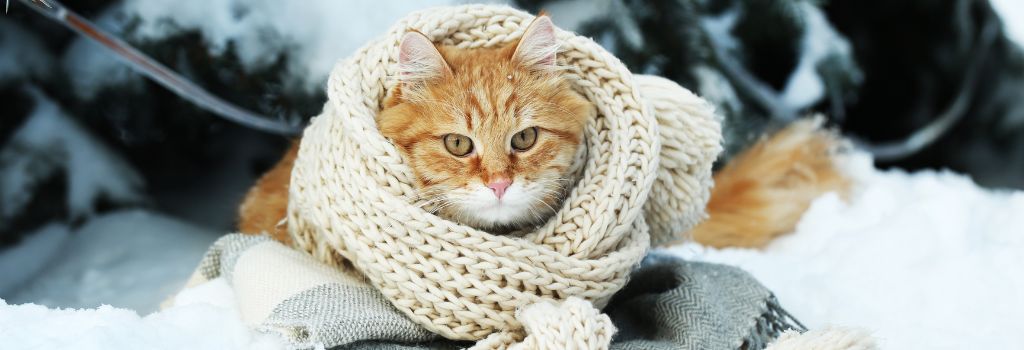Ah, the holiday season! A time of joy, celebration, and cozy gatherings. But amidst the festive decorations and scrumptious feasts, it's essential to remember our furry friends' safety. Just as we childproof our homes for little ones, our pets, with their boundless curiosity, need some safeguarding during this time of year. Join us as we unwrap some key safety tips to ensure that your pets also have a merry and mishap-free holiday season!
Merry Decorations
The holiday season is a time of glittering lights, ornate ornaments, and festive decorations. But what brings joy to our eyes might pose risks for our four-legged buddies.
- Tinsel: Our kitties love its magical sparkle and can’t resist chewing on it. If ingested, tinsel can cause a gastrointestinal obstruction, which can become life-threatening and require surgery.
- Clinical signs of obstruction can include but are not limited to vomiting, diarrhea, anorexia, and dehydration. These signs warrant immediate veterinary attention.
- Candles and Fragrances: Our curious kiddos can knock these over, leading to a fire in your home, burning your pet, or a wax build-up on their fur that is almost impossible to get out! Always supervise lit candles. Also, be cautious with scented oils and potpourri which can be toxic if consumed
- Wires and Batteries: Both of these pose a risk to your pet. If a pet bites into a wire, it can cause an electrical burn in its mouth. Chewing on batteries can lead to chemical burns, and batteries can be very dangerous if ingested. Do not wait to take your pet to the vet if they chew a wire or chew/ingest a battery.
- Ornaments: These pose a risk if broken or ingested. A pet may cut themselves on a broken ornament or could possibly have complications from ingesting an ornament (especially if the hook is attached). Place fragile or breakable ornaments higher up on the tree.
- Christmas Trees: Make sure they are properly anchored so it doesn’t fall over if an adventurous pet goes exploring. Cats might see it as a climbing challenge, and excited dogs can knock it over with a wag of their tail. Ensure your Christmas tree is stable and consider using a gate or enclosure if necessary.
With some mindful adjustments, we can keep our homes merry, bright, and safe for our pets. Because the best gift we can give them is a secure and happy holiday environment!
Holiday Plants
The twinkling lights and festive ornaments are not the only holiday staples we need to be cautious of when our furry friends are prowling around the house. Many traditional holiday plants, while adding beauty and cheer, can be harmful to pets if ingested.
These 4 favorite holiday plants can cause severe issues for your pets if consumed:
- Mistletoe: This classic holiday plant can cause gastrointestinal disorders, cardiovascular problems, and can even be fatal if consumed in large quantities.
- Poinsettias: Often a popular choice during Christmas, these plants can cause mild irritation to a pet’s mouth and stomach, leading to drooling or vomiting.
- Amaryllis: Its beautiful blooms are a sight to behold, but if a pet munches on amaryllis, it can lead to vomiting, diarrhea, abdominal pain, lethargy, and tremors.
- Holly: While it's festive and bright, holly can lead to nausea, vomiting, and diarrhea in pet.
It's crucial to either opt for pet-friendly alternatives or place these plants well out of reach of our curious companions.
Festive Foods
The holidays are synonymous with scrumptious feasts and tempting treats. But while we indulge, it's essential to be aware of what's pet-friendly and what's not. Some holiday foods can be harmful, or even deadly, to our beloved pets.
- Xylitol: Avoid sugar-free treats and gum, and check ingredients carefully. Xylitol can cause severe low blood sugar and lead to death. If your pet ingests a product with xylitol, call your veterinarian right away.
- Human food: Rich food and foods high in fat can cause your pet to have vomiting and diarrhea. These foods can also cause your pet to develop pancreatitis, which is when their pancreas becomes inflamed from the rich and fatty food and can lead to them needing to be hospitalized for supportive care. Beware of bones in food as well since they can be ingested and cause an obstruction. **Don’t forget chocolate, raisins, and macadamia nuts are also toxic to your pet.
- Alcohol: If ingested by your pet, it can cause them to become weak, ill, and possibly go into a coma which can lead to death.
- Check out GeniusVet Blog for more information: 9 Human Foods That Are Toxic to Pets (And Their Healthy Alternatives!)

Winter Safety Tips
The holiday season often brings with it a drop in temperatures, snowflakes, and icy breezes. As we bundle up in cozy sweaters and sip on hot cocoa, it's essential to ensure our furry companions are equally protected from the cold and products we use during this time.
- Coats (more than just fur): If it’s below 20 degrees and your pet has a thin hair coat, consider putting a coat on him or her. If the coat has a belly strap, make sure it is out of the way on male dogs when they urinate.
- Salt: Salt is mildly toxic to dogs. More importantly, it’s a skin irritant and can cause GI upset if directly ingested. Consider using pet-friendly ice-melting products around your home and wiping your pet’s paws off with a damp cloth when they come inside from a walk.
- Antifreeze Alert: This common winter car product is lethal to pets but often tastes sweet. Always clean up spills and store it out of their reach.
- Warm Shelter: If your pet spends considerable time outside, provide them with a warm, insulated shelter to retreat to. Ensure your pet has a warm place to sleep, away from drafts and off the floor. Thermal pet beds or heated pet mats can provide extra warmth. Better yet, keep them indoors during frigid weather.
- Frostbite: This can occur when the temperature is below 20 degrees or if there is a significant windchill. The ears, toes, and tail tip are the most vulnerable areas. Clinical signs of frostbite include redness, swelling, coldness to the touch, and sloughing of the tissue. If you notice these clinical signs, immediately bring your pet inside, start slow rewarming, and contact your veterinarian.
Remember, if it's too cold for you, it's probably too cold for your pet.
And there you have it!
As we deck the halls and revel in holiday cheer, it's heartening to know we've taken those extra steps to keep our four-legged family members safe. Remember, a little preparation and mindfulness can go a long way in ensuring everyone, including our pets, can relish the festivities with joy and peace.
If at any point you are concerned that your pet may have injured themselves or ingested something they shouldn’t have, call your veterinarian. Here's to a safe, warm, and paw-sitively wonderful holiday season for all! Until next time, keep those tails wagging and spirits high.
If you have questions and you'd like to reach out to us, you can call us directly at (425)-292-0288, or you can email us at [email protected]. Don't forget to follow us on social media Facebook, Instagram.
This blog was first seen on Sugar River Animal Hospital.
